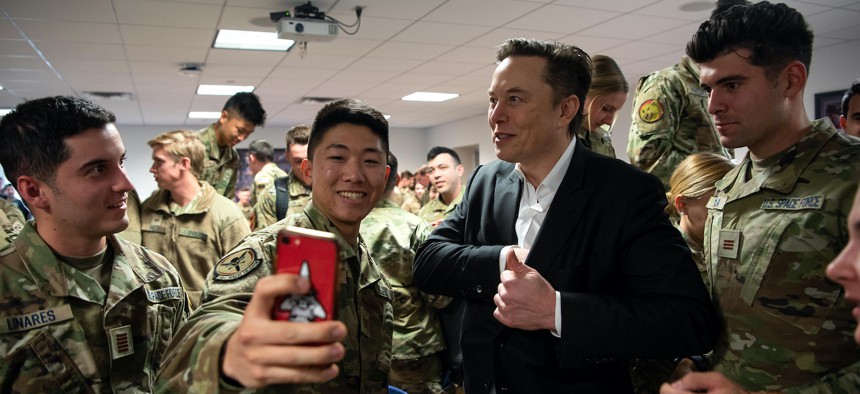
In this April 2022 photo, SpaceX CEO Elon Musk takes selfies with future U.S. Space Force officers at the U.S. Air Force Academy in Colorado Springs, Colo. U.S. Air Force / Trevor Cokley
Military Leaders Praise Musk as Treasury Officials Eye Twitter Deal
Outgoing Chief of Space Operations Gen. Jay Raymond thanked the SpaceX CEO “for being here.”
Elon Musk is not the only defense-industry exec who showed up for the Space Force’s first change-of-command ceremony. But the SpaceX founder and controversial new owner of Twitter was the only one who got a by-name call out from the chairman of the Joint Chiefs of Staff.
“What he symbolizes, in reality, is the combination of the civil and military cooperation and teamwork that makes the United States the most powerful country in space. So, Elon, thank you for making yourself present here today,” Gen. Mark Milley said during the Wednesday ceremony at Joint Base Andrews outside Washington, D.C.
Gen. John “Jay” Raymond, the first chief of space operations and the service’s first member, also thanked Musk before rattling off the names of seven other senior executives in attendance. Raymond is retiring after 38 years of service in the Air Force and Space Force, after passing the Space Force flag to Gen. Chance Saltzman.
Though Musk has long been a darling of the space-focused parts of the U.S. military, Wednesday’s warm reception came as the U.S. Treasury Department is looking into whether it can investigate Musk’s foreign-financed purchase of Twitter, where he is poised to “make it easier for purveyors of false information to go viral,” as strategist Peter Singer wrote this week for Defense One.
Musk’s SpaceX had to fight for a place at the national-security space table—it sued the Pentagon in 2014, saying U.S. military space launches should be bid competitively, instead of simply awarded to the Lockheed Martin-Boeing joint venture United Launch Alliance. The move was championed at the time by the late Sen. John McCain, who had harshly criticized ULA’s reliance on Russian-made rocket engines.
In the process, Musk revealed “tens of billions in potentially unnecessary military spending,” Politico reported in 2016. The company was awarded its first national security space contract in 2016, and on Tuesday launched a Falcon Heavy rocket with that rocket’s first national security space payload: two classified U.S. Space Force satellites.







